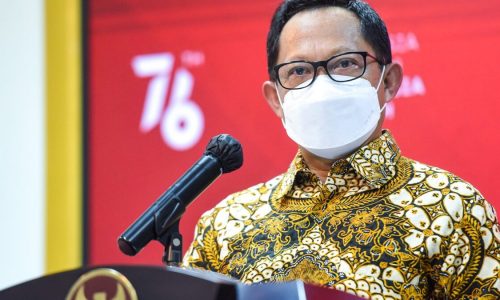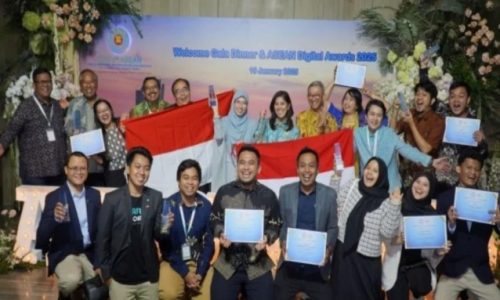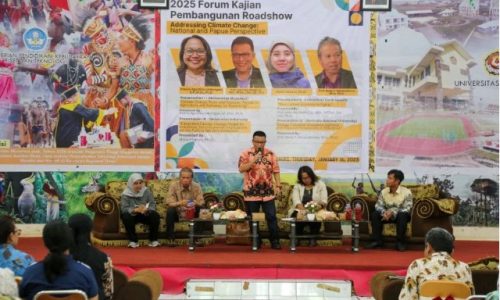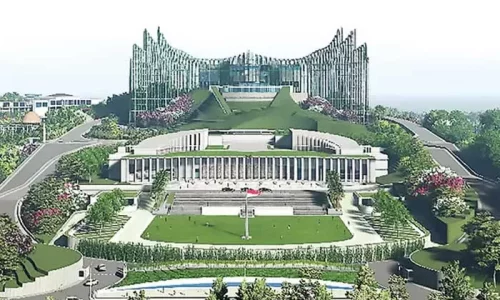Directorate General of Oil and Gas at the Ministry of Energy and Mineral Resources (ESDM) has been actively promoting Carbon Capture and Storage (CCS) technology as key to tackle carbon emissions from the industrial sectors.
The latest campaign by the ministry’s Directorate General of Oil and Gas was held in conjunction with the journalism workshop of CCS technology organized by Indonesia Business Post in Bogor on Saturday-Sunday, January 18-19, 2025.
The country boasts substantial potential for carbon storage, positioning itself as a regional and national leader in CCS, which will not only help in emissions reduction but also attract investment and create economic value from CCS-related activities, including carbon transportation.
As of 2023, Indonesia’s CO2 storage capacity is impressive. For saline aquifers alone, it can store up to 572.8 gigatons (GT) of CO2, with additional capacity of 4.8 GT in depleted oil and gas fields. This brings the total potential CO2 storage capacity to 577.6 GT. The country’s saline aquifer resources have grown considerably from just six basins in 2015 to 20 active production basins by 2023, which reflects the country’s growing CCS capabilities.
Indonesia’s CO2 storage resources are distributed across a range of producing basins, including regions such as North East Java, Tarakan, North Sumatra, Makassar Strait, and many more. These basins provide ample opportunities for large-scale carbon capture projects.
In addition to the growing potential for carbon storage, Indonesia is witnessing significant development in CCS and Carbon Capture, Utilization, and Storage (CCUS) projects. There are currently 15 CCS/CCUS studies underway in Indonesia, with most of these projects expected to start operations by 2030 or later. Some of the major projects include:
- Arun CCS, Joint Venture (JV) Carbon Aceh & PEMA with onstream target in 2029/2030;
- Central Sumtra Basin CCS/CCUS Hubs, Pertamina & Mitsui, with onstream target in 2031/2032;
- CO2 Huff and Puff Gemah, PetroChina Jabung, with ongoing EOR field trial fulfilled by mid-2031;
- Ramba CCUS/EOR, Pertamina, has a potential of 33 MMSCFD from gas process, with target in 2032;
- Pilot Test CO2 Huff and Puff Jatibarang, collaboration between Pertamina & JOGMEC, pilot test Oct 2022-Jan 2023, and onstream target in 2031/2032;
- Gundih CCUS/EGR, a collaboration between Pertamina, JGC, J-Power, JANUS & Jera, with a CO2 potential of 3 million tCO2 for 10 years, with an onstream target in 2030;
- Sukowati CCUS/EOR, Pertamina, JAPEX & JOGMEC, with a CO2 potential of 10.37 million tCO2 for 15 years, with an onstream huff & puff target in Dec 2023, a pilot project in 2025, and commercial in 2033;
- Asri Basin CCS/CCUS Hubs, Pertamina & ExxonMobil with an onstream target in 2030;
- Abadi CCS, Inpex Masela Ltd, with a CO2 potential of 70 million tons (MT) for 28 years, with an onstream target in late 2030;
- Blue Ammonia + CCS Donggi Matindok, Panca Amara Utama, JOGMEC Mitsubishi, ITB & Pertamina, CO2 potential of 19 million tCO2 for 20 years, with onstream target of 2031/2032;
- Abadi CCS Inpex Masela Ltd, with CO2 potential reaching 70 MT of CO2 for 28 years, with onstream target at the end of 2030;
- Kutai Basin CCS Hub, Pertamina & Chevron, with onstream target of 2031/2032;
- CCU to Methanol RU V Balikpapan, Pertamina & Air Liquide, with CO2 potential of 1.44 MT/year H2 plant, with onstream target: 2030;
- East Kalimantan CCS/CCUS, Kaltim Parna Industri & ITB, with CO2 potential: 10 million tCO2 for 10 years;
- Tangguh EGR/CCUS, BP Berau Ltd, with a CO2 potential of 25-33 million tCO2 for 10-15 years, with an onstream target of 2026/2017.
These projects, many of which are being carried out by State-owned energy company Pertamina in collaboration with global partners such as ExxonMobil, Chevron, JOGMEC, Mitsui, and Mitsubishi, are integral to Indonesia’s strategy for large-scale emissions reduction.
Some companies, including Sumitomo and POSCO, have also expressed interest in exploring CCS opportunities in Indonesia. Additionally, major national players like State-owned fertilizer company PT Pupuk Indonesia and State power utility PT PLN are conducting studies to implement CCS in ammonia production and coal-fired power plants.
Through these efforts, Indonesia aims to reduce its national emissions by 31.89 percent (917 MT of CO2e) by 2030, with additional support from international efforts bringing the total reduction to 43.2 percent, or equivalent to 1.114 billion tons of CO2e.
As the country continues to invest in CCS technology and infrastructure, Indonesia is positioning itself as a global leader in emissions reduction and climate action, moving closer to its long-term sustainability goals.









